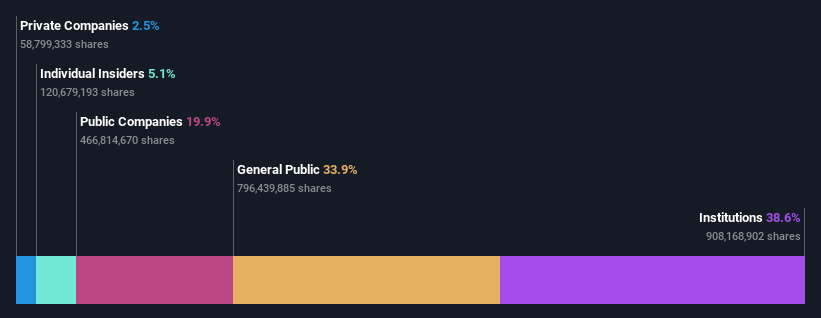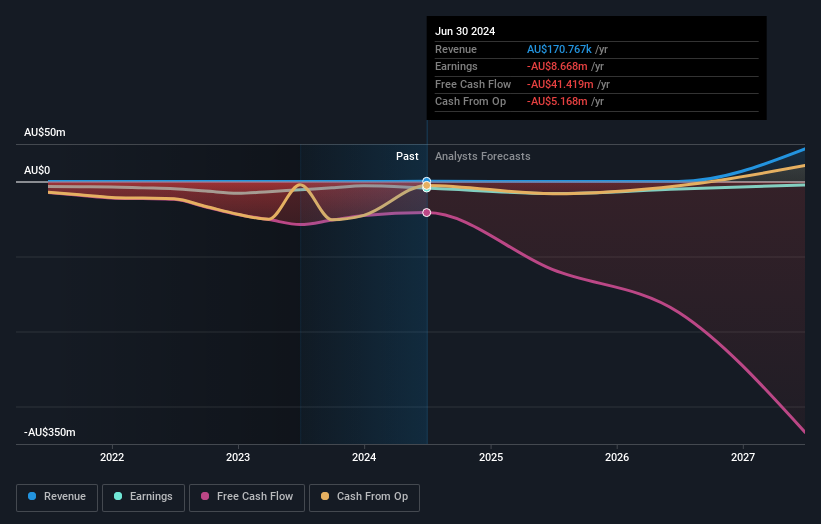- Australia
- /
- Metals and Mining
- /
- ASX:PDI
After a year of 4.7% returns, Predictive Discovery Limited's (ASX:PDI) share price drop last week may have less of an impact on institutional investors

Key Insights
- Given the large stake in the stock by institutions, Predictive Discovery's stock price might be vulnerable to their trading decisions
- 51% of the business is held by the top 6 shareholders
- Insiders have been buying lately
If you want to know who really controls Predictive Discovery Limited (ASX:PDI), then you'll have to look at the makeup of its share registry. And the group that holds the biggest piece of the pie are institutions with 39% ownership. Put another way, the group faces the maximum upside potential (or downside risk).
Institutional investors was the group most impacted after the company's market cap fell to AU$529m last week. However, the 4.7% one-year return to shareholders might have softened the blow. We would assume however, that they would be on the lookout for weakness in the future.
Let's delve deeper into each type of owner of Predictive Discovery, beginning with the chart below.
See our latest analysis for Predictive Discovery

What Does The Institutional Ownership Tell Us About Predictive Discovery?
Institutional investors commonly compare their own returns to the returns of a commonly followed index. So they generally do consider buying larger companies that are included in the relevant benchmark index.
As you can see, institutional investors have a fair amount of stake in Predictive Discovery. This suggests some credibility amongst professional investors. But we can't rely on that fact alone since institutions make bad investments sometimes, just like everyone does. When multiple institutions own a stock, there's always a risk that they are in a 'crowded trade'. When such a trade goes wrong, multiple parties may compete to sell stock fast. This risk is higher in a company without a history of growth. You can see Predictive Discovery's historic earnings and revenue below, but keep in mind there's always more to the story.

We note that hedge funds don't have a meaningful investment in Predictive Discovery. Our data shows that Perseus Mining Limited is the largest shareholder with 20% of shares outstanding. For context, the second largest shareholder holds about 13% of the shares outstanding, followed by an ownership of 5.4% by the third-largest shareholder.
On further inspection, we found that more than half the company's shares are owned by the top 6 shareholders, suggesting that the interests of the larger shareholders are balanced out to an extent by the smaller ones.
While it makes sense to study institutional ownership data for a company, it also makes sense to study analyst sentiments to know which way the wind is blowing. Quite a few analysts cover the stock, so you could look into forecast growth quite easily.
Insider Ownership Of Predictive Discovery
The definition of an insider can differ slightly between different countries, but members of the board of directors always count. Management ultimately answers to the board. However, it is not uncommon for managers to be executive board members, especially if they are a founder or the CEO.
Insider ownership is positive when it signals leadership are thinking like the true owners of the company. However, high insider ownership can also give immense power to a small group within the company. This can be negative in some circumstances.
Shareholders would probably be interested to learn that insiders own shares in Predictive Discovery Limited. As individuals, the insiders collectively own AU$27m worth of the AU$529m company. This shows at least some alignment. You can click here to see if those insiders have been buying or selling.
General Public Ownership
The general public-- including retail investors -- own 34% stake in the company, and hence can't easily be ignored. This size of ownership, while considerable, may not be enough to change company policy if the decision is not in sync with other large shareholders.
Public Company Ownership
We can see that public companies hold 20% of the Predictive Discovery shares on issue. This may be a strategic interest and the two companies may have related business interests. It could be that they have de-merged. This holding is probably worth investigating further.
Next Steps:
While it is well worth considering the different groups that own a company, there are other factors that are even more important. Case in point: We've spotted 4 warning signs for Predictive Discovery you should be aware of, and 2 of them make us uncomfortable.
But ultimately it is the future, not the past, that will determine how well the owners of this business will do. Therefore we think it advisable to take a look at this free report showing whether analysts are predicting a brighter future.
NB: Figures in this article are calculated using data from the last twelve months, which refer to the 12-month period ending on the last date of the month the financial statement is dated. This may not be consistent with full year annual report figures.
New: Manage All Your Stock Portfolios in One Place
We've created the ultimate portfolio companion for stock investors, and it's free.
• Connect an unlimited number of Portfolios and see your total in one currency
• Be alerted to new Warning Signs or Risks via email or mobile
• Track the Fair Value of your stocks
Have feedback on this article? Concerned about the content? Get in touch with us directly. Alternatively, email editorial-team (at) simplywallst.com.
This article by Simply Wall St is general in nature. We provide commentary based on historical data and analyst forecasts only using an unbiased methodology and our articles are not intended to be financial advice. It does not constitute a recommendation to buy or sell any stock, and does not take account of your objectives, or your financial situation. We aim to bring you long-term focused analysis driven by fundamental data. Note that our analysis may not factor in the latest price-sensitive company announcements or qualitative material. Simply Wall St has no position in any stocks mentioned.
About ASX:PDI
Predictive Discovery
Explores for, identifies, and develops economic reserves in West Africa.
Flawless balance sheet very low.
Similar Companies
Market Insights
Community Narratives




